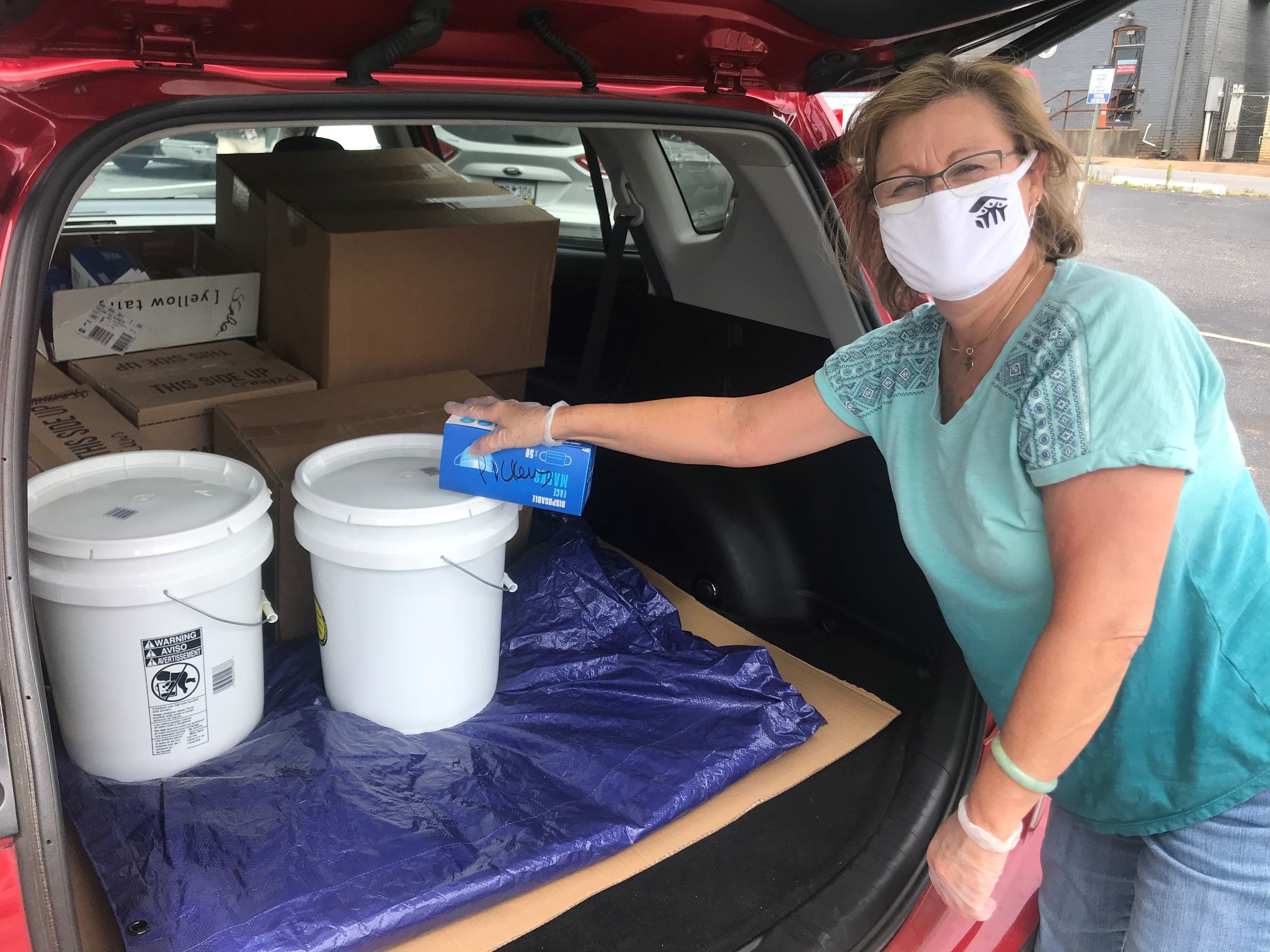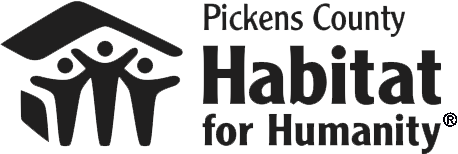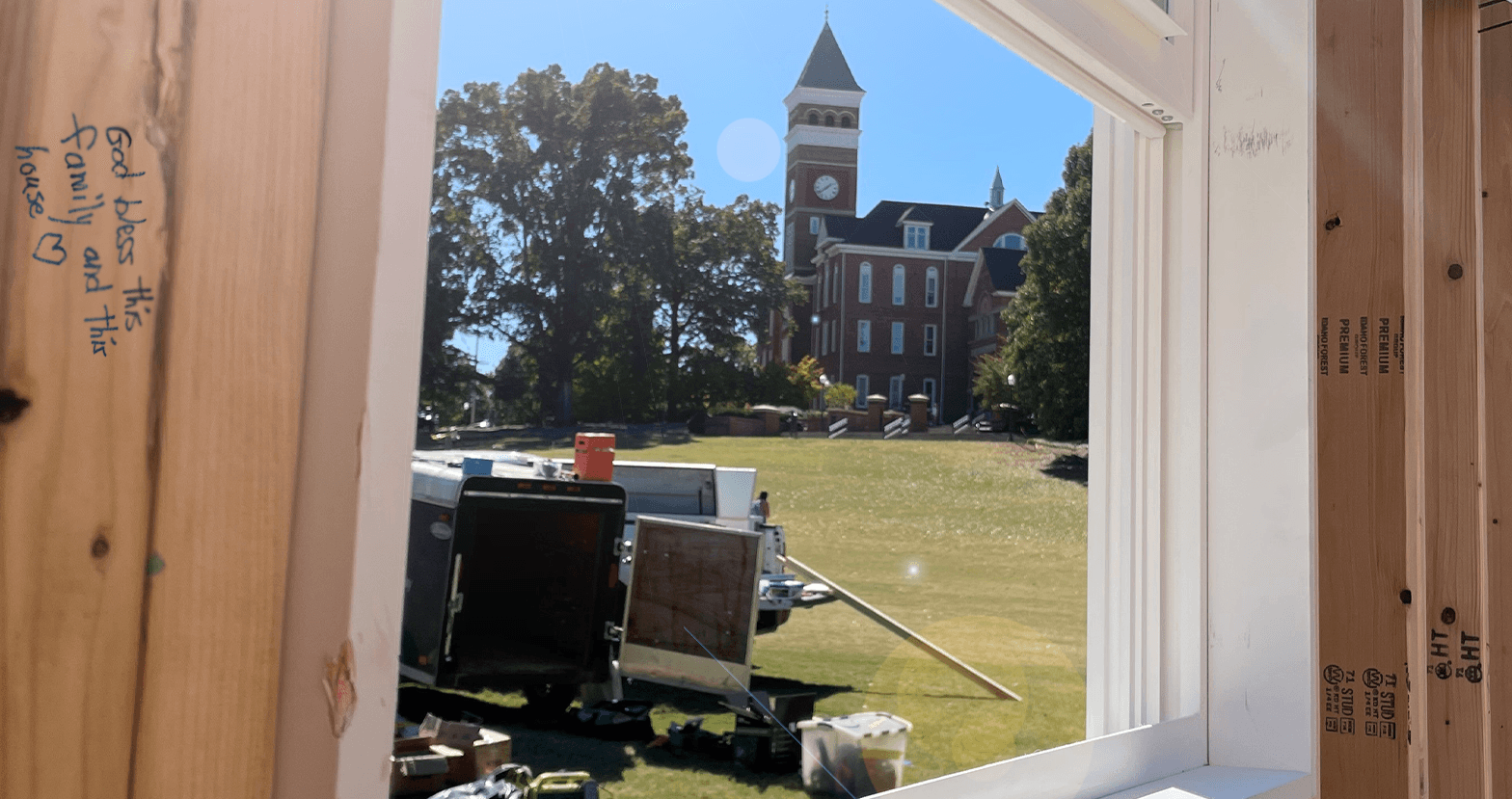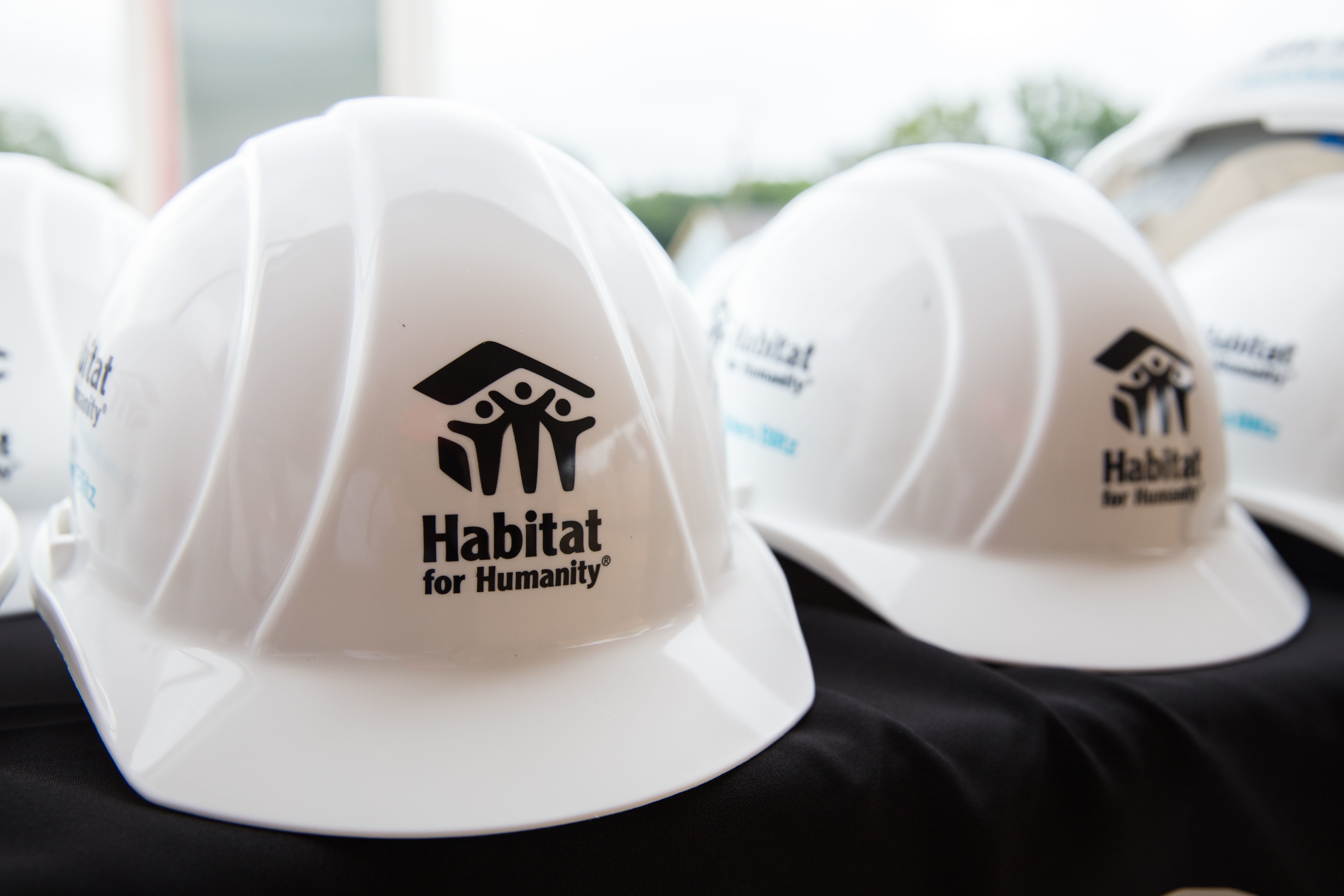
As a small nonprofit affiliate, Pickens County Habitat for Humanity experienced a true shift in the way it operates due to the devastating effects of the COVID-19 pandemic. PCHFH knew this would not be an easy challenge to overcome, but has worked hard to fulfill their mission with persistence and resilience.
One of the first major obstacles that PCHFH faced was having to consider canceling the 2020 annual Have a Heart for Habitat fundraising event.
“I remember probably early March saying, ‘We are going to have to think about canceling [Have a Heart for Habitat],’” said Rose Davis, PCHFH Resource Development Manager. “People all around us were canceling their spring events, and we were just like, ‘this is how it’s going to play out.’”
After a lot of hard work and determination, PCHFH successfully converted the event into Have a Heart for Habitat From Home through digital correspondence with the local community. Although PCHFH could not gather in person to share the good works of their mission like normal, the affiliate was still able to rally the hearts of those who care about Habitat to make the virtual fundraising a success.
In regards to the operations of building homes, Wayne Watson, PCHFH board member and construction and safety committee member, had a good indication of how COVID would affect the affiliate due to his professional work in the construction industry.
Watson shared that he and his co-workers “were looking at policies and making adjustments early on … due to the pandemic that was coming in,” which gave him a heads up of thinking “‘well our Habitat size is much smaller, but we still have similar risks.’”
Watson harnessed what he had gathered through the research and development of safety policies for the construction sites at his job and volunteered to write a COVID-19 safety protocol for the PCHFH construction and safety committee’s review and approval.
Site rules were developed to be posted in visible areas at job sites, which included the mandatory use of masks, social distancing requirements, use of approved disinfectants and the cleaning of shared tools between uses. With that, PCHFH chose to limit the number of volunteers on-site to the steady volunteers from their Tuesday-Thursday crew, decreasing the likelihood of spread and protecting those individuals from the risk of outside volunteers. Only the minimum amount of people absolutely necessary for a particular job-site work at one time.
Executive Director Jill Evans stands with donated hand sanitizer and masks
PCHFH construction coordinator, Chris Mastandrea, shared that despite COVID-19, his work never really came to a halt. The affiliate still has a duty to the families they partner with to continue building homes, and Mastandrea has been a true driving force in getting the jobs done.
First and foremost, productivity of the builds slowed down. Houses that usually take six to seven months, are now taking nine to 10 months to complete due to scheduling and the restrictions on the amount of volunteer workers that can be on a job-site at a time.
Mastandrea emphasized that “PCHFH truly is a family. One of the most difficult things was not being able to see everyone.” Yet he checked up on their regular volunteers weekly to see how they were doing, and even dropped off N95 masks from the affiliate’s inventory when they became hard to find for volunteers who were not venturing far from home.
A big challenge that Chris saw firsthand was the sharp rise in price and scarcity of materials. Striving to build affordable housing during this time has proven difficult, but with the help of amazing donors, negotiations with local stores, and efforts to “measure twice, cut once” to conserve materials, PCHFH has managed to make progress on their builds.
The 2020 annual Clemson University Homecoming build for PCHFH certainly felt the drawbacks of the pandemic as well. Typically the build occurs on-campus at Bowman Field during Homecoming week, then the house is moved to its permanent foundation for completion. Since Homecoming did not officially occur this year due to COVID-19, the build was relocated from Clemson’s Bowman Field to the on-site location where the homeowner will reside in Clemson.
Matt Grant, a junior construction science and management major and construction coordinator for Habitat for Humanity at Clemson University, said there was a lot less interest in the Homecoming build this year, simply because they were not working at the heart of campus. Normally, students see the build coming to life on Bowman Field, which sparks curiosity and fosters a desire to join in as the week progresses. The off-campus location deterred many on-campus students who do not have cars from volunteering as well.
In 2020, the Homecoming build was limited to only eight student volunteers and two adult supervisors on the job-site at a time compared to the typical 20-30 student volunteers and supervisors. Due to a lack of awareness and student volunteers, there was a lot of pressure placed on those who were there to work and get the job done.
Clemson Student Curtis Kubacka volunteers at the 2020 Homecoming Build
“At that time, it was a lot easier for people to just stay home. People weren’t used to activities going on, especially the freshmen coming in,” said Grant.
This year’s Homecoming build was attainable because realistic expectations were set beforehand that this year was going to be different. The goal was to have only the walls put up, when typically the siding, roofing, windows and doors of the house are complete by the end of the Bowman build.
Grant shared that a big motivating factor was the build’s dedication to Kelsey McGhee, an officer team member and assistant Homecoming coordinator of Habitat for Humanity at Clemson University who passed away in a car accident in the summer of 2020. In moments of exhaustion and low morale, Grant said the work crew would remind themselves, “this is why we are doing this. Let’s go on, let’s get it done,” in memory of Kelsey’s passion and commitment to Habitat. Due to tireless volunteers who poured countless hours into the construction of the build, their goal was accomplished by the end of the week.
As COVID-19 infection rates continue to dwindle in the Upstate of South Carolina, PCHFH recently revised their COVID-19 safety protocols to reduce restrictive measures. Individuals and small groups outside of the affiliate’s regular volunteers are now welcomed to help on-site. Masks will only be enforced if distancing six feet apart is not possible due to a specific task, and the sharing of tools will no longer be discouraged. In an effort to keep volunteers and the community safe, PCHFH encourages volunteers to get the vaccine. The positive revisions permit more normal working conditions and an increase in productivity to get back on track building houses in a timely manner.
It is no doubt that the recent pandemic has presented countless challenges for all communities and organizations. Nonetheless, the passionate volunteers, committed staff members and hard-working homeowners remained crucial to the success of the organization and continuation of fundraising and building efforts. While the pandemic is not over, the hard work and preparation to adapt and overcome has allowed PCHFH to carry out its mission and continue building homes with love.
As a small nonprofit affiliate, Pickens County Habitat for Humanity experienced a true shift in the way it operates due to the devastating effects of the COVID-19 pandemic. PCHFH knew this would not be an easy challenge to overcome, but has worked hard to fulfill their mission with persistence and resilience.
One of the first major obstacles that PCHFH faced was having to consider canceling the 2020 annual Have a Heart for Habitat fundraising event.
“I remember probably early March saying, ‘We are going to have to think about canceling [Have a Heart for Habitat],’” said Rose Davis, PCHFH Resource Development Manager. “People all around us were canceling their spring events, and we were just like, ‘this is how it’s going to play out.’”
After a lot of hard work and determination, PCHFH successfully converted the event into Have a Heart for Habitat From Home through digital correspondence with the local community. Although PCHFH could not gather in person to share the good works of their mission like normal, the affiliate was still able to rally the hearts of those who care about Habitat to make the virtual fundraising a success.
In regards to the operations of building homes, Wayne Watson, PCHFH board member and construction and safety committee member, had a good indication of how COVID would affect the affiliate due to his professional work in the construction industry.
Watson shared that he and his co-workers “were looking at policies and making adjustments early on … due to the pandemic that was coming in,” which gave him a heads up of thinking “‘well our Habitat size is much smaller, but we still have similar risks.’”
Watson harnessed what he had gathered through the research and development of safety policies for the construction sites at his job and volunteered to write a COVID-19 safety protocol for the PCHFH construction and safety committee’s review and approval.
Site rules were developed to be posted in visible areas at job sites, which included the mandatory use of masks, social distancing requirements, use of approved disinfectants and the cleaning of shared tools between uses. With that, PCHFH chose to limit the number of volunteers on-site to the steady volunteers from their Tuesday-Thursday crew, decreasing the likelihood of spread and protecting those individuals from the risk of outside volunteers. Only the minimum amount of people absolutely necessary for a particular job-site work at one time.
Executive Director Jill Evans stands with donated hand sanitizer and masks
PCHFH construction coordinator, Chris Mastandrea, shared that despite COVID-19, his work never really came to a halt. The affiliate still has a duty to the families they partner with to continue building homes, and Mastandrea has been a true driving force in getting the jobs done.
First and foremost, productivity of the builds slowed down. Houses that usually take six to seven months, are now taking nine to 10 months to complete due to scheduling and the restrictions on the amount of volunteer workers that can be on a job-site at a time.
Mastandrea emphasized that “PCHFH truly is a family. One of the most difficult things was not being able to see everyone.” Yet he checked up on their regular volunteers weekly to see how they were doing, and even dropped off N95 masks from the affiliate’s inventory when they became hard to find for volunteers who were not venturing far from home.
A big challenge that Chris saw firsthand was the sharp rise in price and scarcity of materials. Striving to build affordable housing during this time has proven difficult, but with the help of amazing donors, negotiations with local stores, and efforts to “measure twice, cut once” to conserve materials, PCHFH has managed to make progress on their builds.
The 2020 annual Clemson University Homecoming build for PCHFH certainly felt the drawbacks of the pandemic as well. Typically the build occurs on-campus at Bowman Field during Homecoming week, then the house is moved to its permanent foundation for completion. Since Homecoming did not officially occur this year due to COVID-19, the build was relocated from Clemson’s Bowman Field to the on-site location where the homeowner will reside in Clemson.
Matt Grant, a junior construction science and management major and construction coordinator for Habitat for Humanity at Clemson University, said there was a lot less interest in the Homecoming build this year, simply because they were not working at the heart of campus. Normally, students see the build coming to life on Bowman Field, which sparks curiosity and fosters a desire to join in as the week progresses. The off-campus location deterred many on-campus students who do not have cars from volunteering as well.
In 2020, the Homecoming build was limited to only eight student volunteers and two adult supervisors on the job-site at a time compared to the typical 20-30 student volunteers and supervisors. Due to a lack of awareness and student volunteers, there was a lot of pressure placed on those who were there to work and get the job done.
Clemson Student Curtis Kubacka volunteers at the 2020 Homecoming Build
“At that time, it was a lot easier for people to just stay home. People weren’t used to activities going on, especially the freshmen coming in,” said Grant.
This year’s Homecoming build was attainable because realistic expectations were set beforehand that this year was going to be different. The goal was to have only the walls put up, when typically the siding, roofing, windows and doors of the house are complete by the end of the Bowman build.
Grant shared that a big motivating factor was the build’s dedication to Kelsey McGhee, an officer team member and assistant Homecoming coordinator of Habitat for Humanity at Clemson University who passed away in a car accident in the summer of 2020. In moments of exhaustion and low morale, Grant said the work crew would remind themselves, “this is why we are doing this. Let’s go on, let’s get it done,” in memory of Kelsey’s passion and commitment to Habitat. Due to tireless volunteers who poured countless hours into the construction of the build, their goal was accomplished by the end of the week.
As COVID-19 infection rates continue to dwindle in the Upstate of South Carolina, PCHFH recently revised their COVID-19 safety protocols to reduce restrictive measures. Individuals and small groups outside of the affiliate’s regular volunteers are now welcomed to help on-site. Masks will only be enforced if distancing six feet apart is not possible due to a specific task, and the sharing of tools will no longer be discouraged. In an effort to keep volunteers and the community safe, PCHFH encourages volunteers to get the vaccine. The positive revisions permit more normal working conditions and an increase in productivity to get back on track building houses in a timely manner.
It is no doubt that the recent pandemic has presented countless challenges for all communities and organizations. Nonetheless, the passionate volunteers, committed staff members and hard-working homeowners remained crucial to the success of the organization and continuation of fundraising and building efforts. While the pandemic is not over, the hard work and preparation to adapt and overcome has allowed PCHFH to carry out its mission and continue building homes with love.


